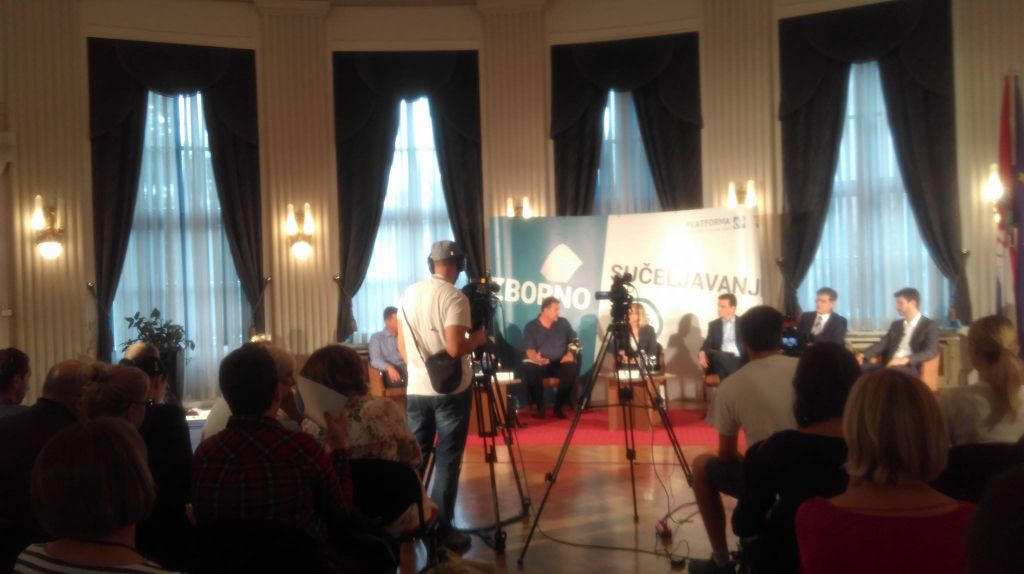Ivan Novosel, Director of Programs at Human Rights House Zagreb and a coordinator of Platform 112, commented:
“The Orešković Government has had a devastating impact on liberal democracy and social pluralism. It has attacked press freedoms and media independence, initiated a crackdown on structures that support a sustainable civil society, and infringed on the right to freedom of association.”
“These central issues are important for the overall quality of a truly democratic and inclusive society and political system, and we wanted to put them back on the political agenda,” continued Novosel.
The debate included representatives from six major political parties and coalitions, and was framed in the context of 46 demands issued by Platform 112 to the political parties ahead of the election campaign. These demands included the rejection of fascism, xenophobia, militarism, and clericalism as phenomena incompatible with democracy, and the implementation of reforms that bring socio-economic security, equality, and sustainable development in which public goods and the economy serve the people, not the enrichment of the privileged.
Platform 112 called upon all of the candidates to build a Croatian society that is open within itself and open to the world, and which has zero tolerance for corruption and clientelism. It demanded an end to human rights violations and discrimination, and to efforts to erode civil and media freedoms.
Human Rights House Zagreb and its member organisations contributed strongly to the Platform 112 election activities, helping to compose the 46 demands, analysing the parties’ responses to them, and organising the debate, which was televised live on 6 September 2016.
The parties responded by stating a high level of support for the Platform 112 demands.
Novosel welcomed their response: “Even if their support is only declaratory, we welcome parties’ commitments to the values of human rights, solidarity, tolerance, inclusiveness, good governance, and the rule of law. We consider this as a good start, and expect future decision-makers to engage in a real dialogue with civil society organisations and citizens on the specific content of future policies and budget priorities, in order to convert their pledges into reality.”
The HDZ-MOST coalition government led by prime minister Tihomir Orešković came to power following parliamentary elections on 8 November 2015. This government resigned in July 2016 due to a successful no-confidence motion, prompting snap elections to be held on 11 September 2016.
Florian Irminger, Head of Advocacy at Human Rights House Foundation, commented:
“The authorities up for re-election in Croatia have acted to undermine the pillars of the Croatian democracy, such as the Ombudsman office and the independence of media, and they have cut funding for independent NGOs.”
“This mirrors trends in other European countries that have followed the model of Hungarian Prime Minster Orban’s ‘illiberal democracy,’ which is increasingly a threat to civil society space and the rule of law in those countries. The Croatian authorities, whoever they will be after the weekend and whatever their policies are, must ensure that they do not undermine Croatia’s democracy. They must protect the space for public dialogue and disagreement and must recognise that civil society space is absolutely key in any country, including Croatia. Meeting the legitimate demands outlined by Platform 112 and discussed on Tuesday would be great progress in this regard,” continued Irminger.
In May 2016, the parliament rejected the annual report of the Croatian Ombudsman for 2015. Human Rights House Zagreb condemned this “political attack on the independence of the Office of the Ombudsperson,” and called this a “direct blow by the ruling party to the human rights and the rule of law.”
The authorities have also blockaded two of the key public foundations that support civil society in Croatia – the National Foundation for Civil Society Development and the Foundation Kultura Nova – through refusing to appoint new members to their boards. The authorities have also cut by half the lottery revenues allocated to the National Foundation for Civil Society Development, and this cut has been exacerbated by long delays in the activation of European Social Fund (ESF) funding for civil society.
“The authorities have also employed rhetoric that human rights NGOs are against Croatia and Croatian values, when they should support these organisations and the promotion of all human rights as essential for Croatia and Croatian democracy,” continued Irminger.
The Croatian authorities have pursued a crackdown on independent media. The Chair of the Agency and Council for Electronic Media was forced to resigned due to political pressure, and the Government proposed the dissolution of the entire Council. This followed a protest march by pro-Government war veterans, attended by Deputy Speaker of the Parliament, in which pro-fascist and xenophobic insults were shouted.
The government also dissolved the Committee for Non-profit Media and slashed state funding for non-profit media, pushing the entire sector into financial crisis. Further, the Croatian Parliament removed the Director of Croatian Public Television, precipitating the rapid removal and replacement of editors in all programmatic segments.
In August 2016, Platform 112 condemned verbal abuse and physical violence against peace activists, and held the authorities responsible for the violence.
Following a visit to Croatia in April 2016, Nils Muižnieks, Council of Europe Commissioner for Human Rights, commented: “Social cohesion and pluralism are under threat in Croatia. I urge the authorities to initiate and engage in an open dialogue with all stakeholders in order to protect pluralism and avoid further polarisation in society.”
Irminger commented: “The government must realise that having the vote of the majority does not mean having the power to do everything, and that as the Government it must ensure that those who speak up for human rights, for minorities, can continue to do so even if their views differ from the views of the majority.”
In April 2016, Platform 112 published a review of the Orešković Government’s first 100 days in power, highlighting moves toward illiberal democracy.





